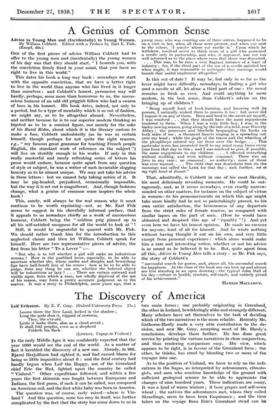The Discovery of America
Leif Eriksson. By E. F. Gray. (Oxford University Press. Ile. )
Looms there the New Land, locked in the shadow ;
Long the gods shut it, niggard of newness,
They, the o'er-old. Little it looks there, slim as a cloud-streak ; It shall fold peoples, even as a shepherd Foldeth his flock.
(LowELL, Voyage to Vinland.) IN the early Middle Ages it was confidently expected that the year 1000 would see the end of the world. As a matter of fact it heralded the discovery of a new one. Already, in 986, Bjarni Herjulfsson bad sighted it, and had earned blame for being so little inquisitive about it : and the fatal century had hardly begun when Leif the Happy, son of the Greenland chief Eric the Red, lighted upon the country he called " Vinland." Other expeditions followed, and within a few years the first skirmish was fought between Europeans and Indians', the first poem, if such it can be called, was composed on American soil, and the first white baby was born in America.
The question was, of course,, early raised—where is Vin- land ? And this question, none too easy in itself, was further complicated by the fact that the story has come down to us in
two main forms ; one probably originating in Greenland, the other in Iceland, bewilderingly alike and strangely different. Many scholars have set themselves to the task of deciding which of the two narratives is the more reliable. Recently Mr. Gathorne-Hardy made a very able contribution to the de- cision, and now Mr. Gray, accepting most of Mr. Hardy's conclusions, develops them further. He has done great service by printing the various narratives in close conjunction, and thus rendering comparison easy. His view, which appears to be right, is in favour of the Greenland form ; the other, he thinks, has erred by blending two or more of the voyages into one.
As to the position of Vinland, we have to rely on the indi- cations in the Sagas, as interpreted by astronomers, ethnolo- gists, and men who combine knowledge of the ground with sufficient geological science to be able to appreciate the changes of nine hundred years. These indications are many. It was a land of warm winters ; it bore grapes and self-sown wheat ; the natives the adventurers met, whom they called Skraellings, seem to have been Esquimaux ; and the time taken on the voyage from Eric's Greenland stead can be
reckoned with some degree of accuracy. But the most im- portant statement of all is that in one of the versions : " The days and nights were more equal in length than in Greenland ; the sun there, on the shortest day of the year, had eyktarstadr and dagmalastadr." This, interpreted by Mr. Gray in a special dissertation, where he has used expert astronomical aid, seems to settle the latitude and longitude of Lcirs house almost beyond doubt. It was on No Man's Land, an island in Narragansett Bay, a little south-west of Cape Cod. The Esquimaux are no longer there, and neither is the man with one foot who is said to have killed one of the explorers. Other- wise, allowance being made for coastal changes, everything seems to lit. Mr. Gray's admirable maps and plans, as well as his explanations—he has studied the whole region with his own eyes—enable us all to form our conclusions.
But, whether Mr. Gray is right or wrong, no astronomical or geological knowledge is necessary for us to enjoy the sagas to the full. They may be obscure and inaccurate here and there, but they are everywhere delightful, alike to the lover of plain story-telling and to the student of manners and customs. Where can we find better descriptions than the famous one of Gudrid, " fairest of women and a paragon in all manner of behaviour," as she sings the " warlock-songs " to the Little Sibyl ? But possibly still better is the story of Bjarni:
." Bjarni was driven into the Maggot-sea, and they knew not till the ship was all riddled with the maggots. Then they took counsel as to what they should do. They had a boat that was smeared with seal-tar, which men say the maggot will not touch : but it was found that the boat would hold but half the crew. Then Miami said that not rank but the lot should decide who should go in the boat : and the lot fell on Bjarni among others. And when they were in the boat, a young Icelander, comrade of Bjarni, said Art thou thinking, Bjarni, to sunder from me here t ' Bjarni said, So it needs must be.' Not so didist thou promise, when I came with thee from my father's dwelling.' 'No other rede see I, but what is thine 1' That we should change places, and thou come hither and I thither.' Bjarni answered, ' I see thou longest sorely for life, and thinkest it a great thing to die.' Wherefore they changed places the man into the boat, and Bjarni into the ship : and that is the tale of men, that Bjarni and those who were in the ship with him perished in the Maggot-sea. But the boat and they who were in it sailed away till they made land, and there they told this story."
Leif and Bjarni were true ancestors of Drake and Humphrey



































 Previous page
Previous page